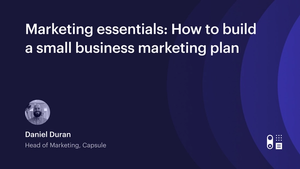SEO doesn’t have to be intimidating or costly. For small businesses, the right tools can make all the difference, helping you attract more customers and stand out online – without much effort.
We’ve curated the best SEO tools for small businesses: affordable, easy to use, and packed with features that matter.
Get ready to simplify SEO and start seeing real results!
Keyword research tools
Keyword research is the process of finding keywords for your content strategy. The reason you're reading this article? We found the keyword ‘best SEO tools for small businesses’ and decided it would be superb to cover it for our readers – since you’re clearly looking for it!
Keyword research tools can help you answer questions such as:
- How many people search for a particular keyword every month?
- How difficult is it to rank for a given keyword (on a scale from 0-100)?
- What keywords are your competitors ranking for?
- Which related keywords should you target for full topic coverage?
- Which websites are ranking for your target keywords?
You'll get data to accurately choose keywords for your content instead of guessing them and hoping that search engines pick something up.
Kinga Edwards, Owner and Creative Director of Brainy Bees SEO services says:
“A lot of small business owners think SEO is this big-budget, high-ticket agency-only game, but that’s not true. I worked with a local bakery my friend runs, and all we did was tweak their Google Business Profile, write proper descriptions for their cakes, and use a free keyword tool to figure out what people actually search for.
"Within a few months, we went from being buried on page five to showing up right when someone in town searched for ‘best birthday cakes near me.’ You don’t need to spend a fortune — just a bit of time and common sense.”
These are our top choices:
Google Keyword Planner
Need reliable keyword data? Google Keyword Planner offers free, direct access to Google’s own insights. It also provides Google Ads data, a feature usually locked behind paywalls in other tools. This makes it valuable not just for SEO strategies but also for planning PPC campaigns! Quickly check search volumes, competition, and bid estimates – all free.
Our rating: 7.5/10
Ubersuggest
Type in a keyword, and Ubersuggest provides a range of related keyword suggestions to spark content ideas. Ideal for beginners in keyword research – and considered one of the most user-friendly SEO solutions out there.
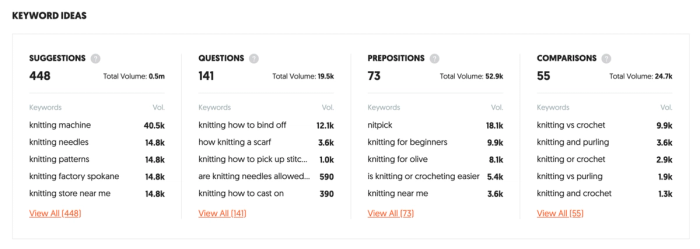
With Ubersuggest, you also get data on search volumes, keyword difficulty, and competitor analysis.
For instance, start with a seed keyword like 'knitting,' and Ubersuggest will generate various directions to explore:
- Knitting patterns
- Knitting how to bind off
- Knitting for beginners
- Knitting vs purling
- Is knitting or crocheting easier
While it’s great for brainstorming, remember that its accuracy, especially for long-tail keywords, may not match the precision of Google Keyword Planner.
Our rating: 8/10
KeywordTool.io
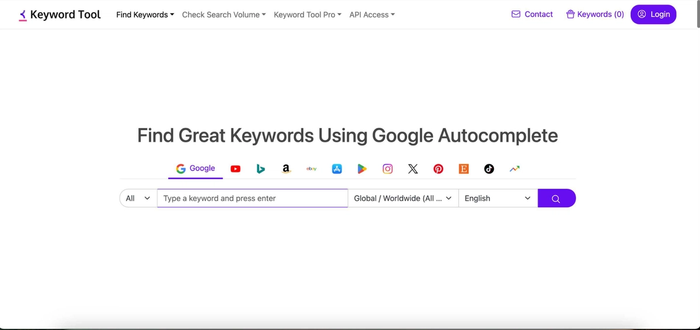
The world doesn’t revolve around Google alone, and KeywordTool.io knows it! You can explore keyword data for more platforms than just Google, including the App Store, eBay, and Instagram.
The free version provides basic keyword information. The following screenshot shows 'knitting' (and its varieties) popularity on Amazon:
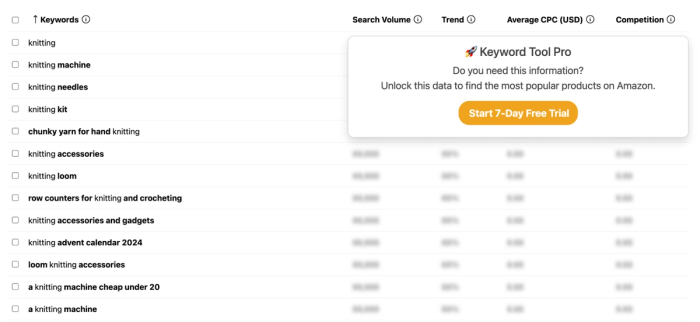
You must upgrade to a paid plan ($89/mo) for more in-depth insights and additional data.
Our rating: 7.5/10
SEMrush's Keyword Magic Tool
Imagine a full-scale SEO machine that handles everything from keyword suggestions to competitive analysis. SEMrush’s Keyword Magic Tool is exactly that.
Designed for SEO strategists, this tool goes beyond basic keyword research by offering AI-driven suggestions that turn a single seed keyword into a complete content roadmap. For example, if ‘sourdough bread recipes’ is your main keyword, Keyword Magic Tool can quickly generate a rich list of variations and related terms – so you can cover all angles without endless manual research.
The only catch? You'll need to sign up to access even the most basic features.
Our rating: 7/10
Ahrefs Webmaster Tools
Why pay for complex SEO tools when Ahrefs Webmaster Tools gives you targeted insights for free? Get an entire site audit revealing SEO issues that may hold you back – broken links, content gaps, underperforming pages – along with straightforward guidance to fix them. This tool provides reliable data on search traffic, keyword opportunities, and trend analysis without charging a hefty subscription fee.
To use it for free, you must verify your website ownership by connecting Ahrefs to your Google Search Console dashboard.
Our rating: 8.5/10
SERanking
SE Ranking comes with a unique Keyword Grouping Tool – a feature most competitors don’t provide or only offer as a paid add-on.
It lets you quickly organize keywords into clusters, giving you a solid foundation for targeted content planning. Instead of just offering keyword suggestions, this tool helps you map out an actionable content strategy.
Our rating: 8/10
Moz Keyword Explorer
Moz Keyword Explorer offers valuable insights like search intent and competitor analysis in its free trial. With this tool, you can check search volumes and understand the purpose behind each keyword – whether users are looking to buy, learn, or compare options. Moz also analyzes top-ranking competitors to help you structure your content to outperform them.
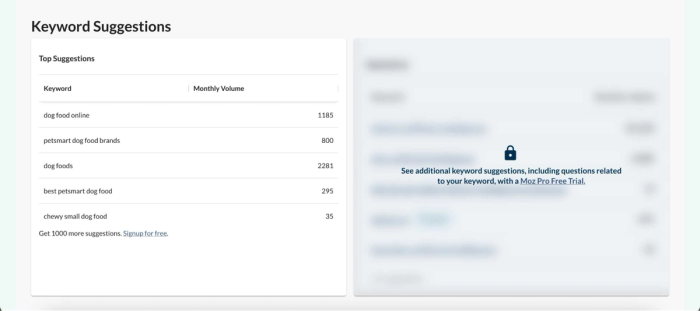
Our rating: 6.5/10
Also Asked
Also Asked helps small businesses uncover exactly what their potential customers ask about – pulling real questions from Google’s 'People Also Asked' box.
Let’s say that you run a pet supply shop, and ‘dog food’ is one of the products that your potential customers might look for. Typing 'dog food' in Google can reveal specific questions:
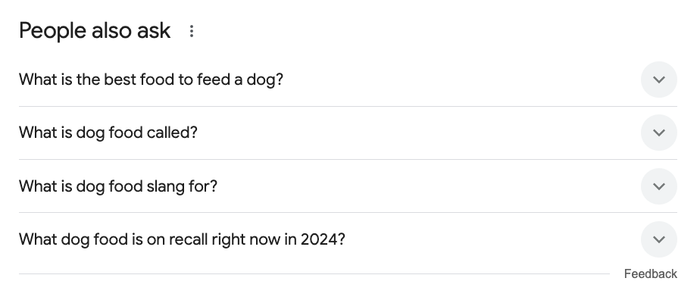
Then, let's say that you'd like to cover them on your website, but you need more ideas. By using AlsoAsked, you can discover related topics worth writing about:
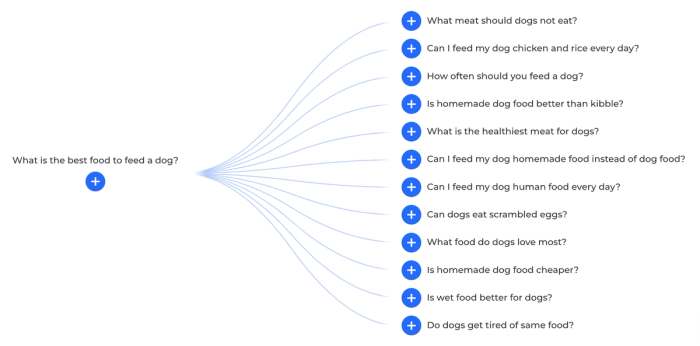
Within seconds, you get 12 other suggestions based on just one topic.
Our rating: 8.5/10
Answer the Public
AnswerThePublic allows small businesses to expand their content ideas using Google's autocomplete suggestions. Let’s come back to our 'dog food' keyword. Type it in, and you’ll get a range of related queries and even some comparison ideas you can cover.
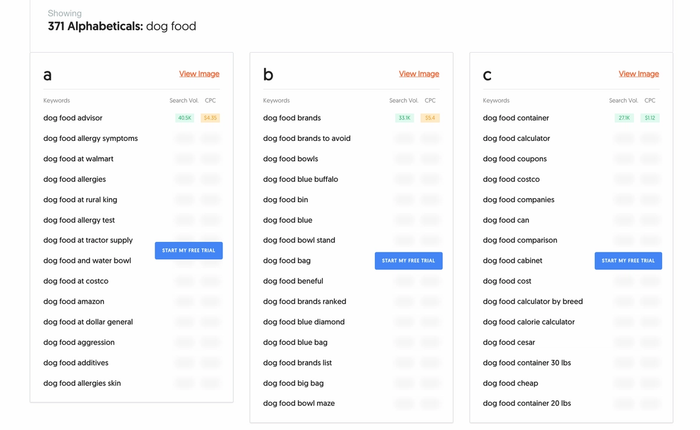
With search support not only for Google, but also TikTok, YouTube, Amazon, or Instagram, it’s useful for brands looking to build content across multiple platforms. You can reach more customers by answering the exact queries they’re looking for!
Our rating: 7.5/10
On-page SEO tools
On-page SEO, true to its name, deals with all the elements directly on your page that can impact search rankings. You can use it to structure headings, fine-tune keyword density, add internal links, and optimize image alt texts to make your content more search engine-friendly.
Yoast SEO
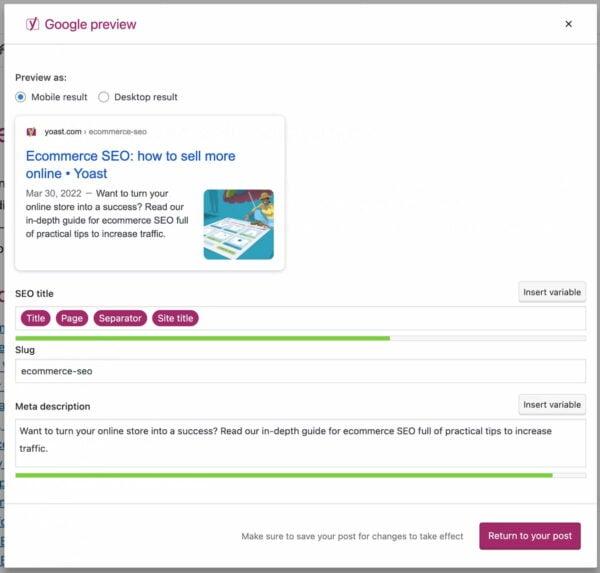
Yoast SEO serves as a practical checklist before publishing your article on WordPress, covering key SEO elements. This plugin prompts you to fill in page titles, meta descriptions, headings, and image alt texts. It will also flag your content if it doesn't contain enough keywords, internal links, or external links.
It takes only a few minutes to complete, but those quick adjustments can impact SEO optimization, helping your content reach your target audience.
Our rating: 7.5/10
RankMath
RankMath brings depth beyond Yoast, offering tools for those wanting more than basic SEO tweaks. With RankMath, you can sync Google Search Console with WordPress, build structured data schemas for richer search results, and optimize specifically for local SEO or knowledge graphs. For an extra technical edge, you can also control sitemaps.
Our rating: 7/10
YARPP WordPress Plugin
Internal linking can be time-consuming and far from intuitive, but SEO tools like YARPP (Yet Another Related Posts Plugin) simplify the process. Using this WordPress plugin, you can automatically place relevant pages, posts, and custom post types related to the current page.
For instance, if someone is reading your post on the best fragrances for men, YARPP could seamlessly recommend them your ‘Top Perfumes for 2025’ list or a ‘Gift Guide for Men.’ These related posts serve as internal links, improving your site's SEO while keeping readers engaged and exploring more of your content – all without manual effort.
Our rating: 8/10
Internal Link Juicer
Ever wish internal linking could feel even more natural in your posts? Unlike YARPP, which places related posts below the main content, Internal Link Juicer works within the text itself.
When you set keywords as anchors, this plugin automatically links to relevant pages whenever those terms appear to blend links seamlessly into any text.
It’s a practical solution for larger sites where manual linking would take ages, helping your readers discover more without interrupting their reading experience.
Our rating: 8.5/10
Screaming Frog SEO Spider
Screaming Frog provides small business owners with an analysis of their website’s health, uncovering issues that could quietly undermine search rankings. Simply enter your site's URL to search for broken links, duplicate content, missing headings, and lengthy meta descriptions.
With Screaming Frog, you can catch and fix SEO issues that can impact visibility without hiring an external expert. You can upgrade the tool to a paid, more advanced version for $259 a year, but a free version is usually more than enough.
Our rating: 8.5/10
Content creation and optimization
Creating content is only half the battle – optimizing it for search engines and your target audience is what truly drives performance. High-quality, relevant content is key to ranking well, but not everyone is a natural copywriter. That’s where content marketing tools come in. They help you brainstorm engaging topics, get past writer’s block, and structure blog posts that resonate with readers.
Grammarly
Grammarly might not be a regular SEO tool, but it plays a big role in SEO by ensuring your content is clear, polished, and professional. Poor grammar, unclear wording, and awkward phrasing can hurt readability, which impacts user experience – one of the factors search engines consider in ranking content.
Grammarly integrates with your web browser, providing real-time suggestions for grammar, spelling, clarity, and tone as you type. The free version offers plenty of value, covering the essentials to improve your content on the spot. Premium packages offer more features and insights to help you become a better writer.
Our rating: 9/10
Copy.ai
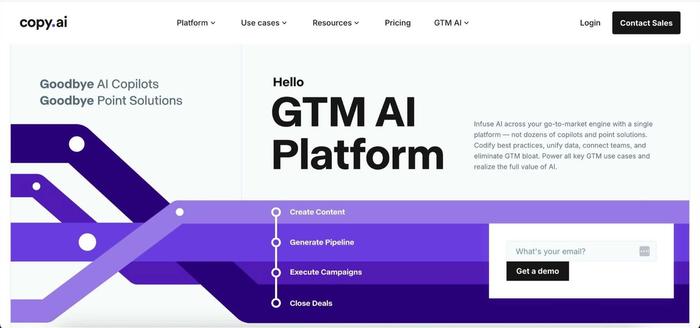
Need to churn out content without spending hours? Copy.ai helps small businesses create everything from product descriptions to in-depth articles with minimal input.
Just provide a keyword and a few instructions – and it delivers a ready-to-edit draft, even partially optimized for SEO. With Copy.ai, you can improve your publishing schedule and keep content flowing.
Our rating: 8.5/10
Headline Studio
Crafting the perfect headline is very important for SEO, but it’s not always easy to nail down one that’s both catchy and keyword-optimized. Headline Studio by CoSchedule helps solve this challenge by analyzing and scoring your headlines, giving you insights into what’s working and what’s missing.
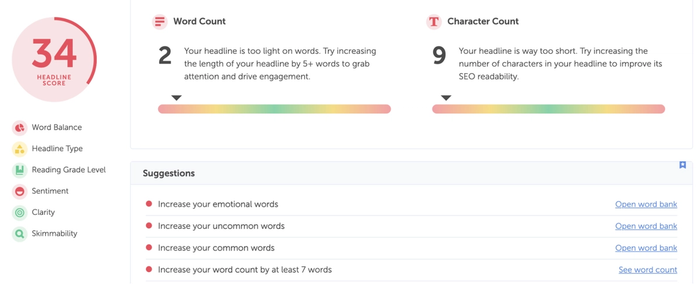
The tool’s scoring feature guides you to tweak and refine your headlines for maximum impact.
Our rating: 9/10
Jasper.ai
Wondering how AI can make SEO easier? Jasper.ai is more than just a content editor. Initially a basic writing tool, it’s now packed with features that help small businesses create SEO-optimized content without breaking a sweat.
Feed it a keyword and a few specifics, and it produces ready-to-use drafts tailored for blog posts, product descriptions, or even social media updates. Jasper also adapts to your brand’s tone, ensuring all content aligns with your style. With seamless integrations for Google Chrome and Google Docs, it becomes a natural part of your content creation process.
Our rating: 8.5/10
SurferSEO
SurferSEO stands out beyond simple content editing: it leverages extensive SEO data to guide your strategy. Surfer analyzes top-ranking content, keyword trends, and search intent to give you relevant content recommendations.
Its unique topical map feature lets you plan an entire content strategy around your core keywords, building authority in your niche. In the example below, you can see how well one SaaS company covers sales-related keywords – and what they can write about to achieve full topical coverage:
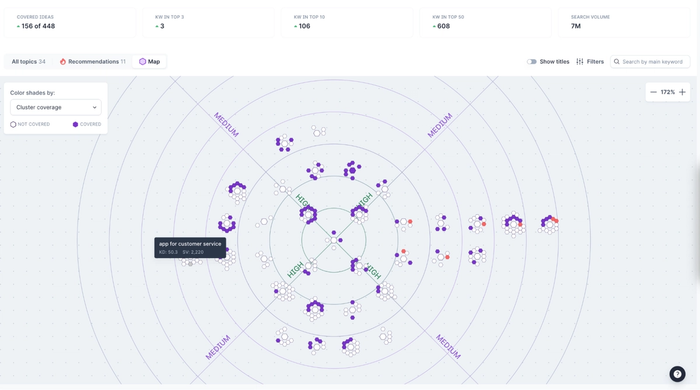
With Surfer, you gain access to powerful data-backed SEO tools that help you compete more effectively, all within an intuitive platform.
Our rating: 8.5/10
Backlink analysis tools
Data shows that the top-ranking page on Google has an average of 3.8 times more backlinks than those in positions 2-10. But it’s not just about quantity. High-quality, relevant backlinks are essential for building authority.
Backlink analysis tools let you see who’s linking to your site, identify valuable links or opportunities, and find gaps in your strategy.
Moz Link Explorer
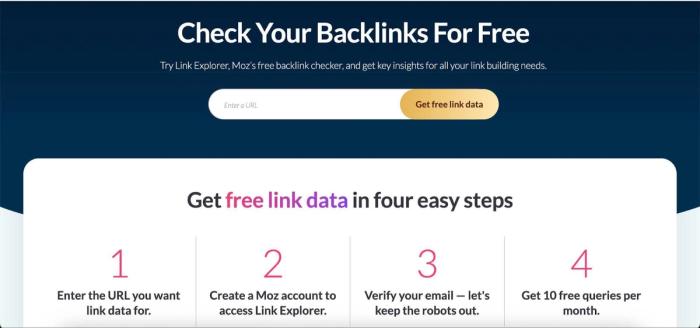
Moz Link Explorer is useful for analyzing your backlink profile, with essential insights like Domain Authority, Spam Score, or top inbound links.
The real deal here, though, is the Link Intersect tool. What if you could see exactly where your competitors get their backlinks – and spot the ones you’re missing? Link Intersect tool does just that. You can use this feature to identify sites linking to your competitors but not to you, letting you explore valuable backlink opportunities.
Our rating: 7/10
Backlink Checker by Ahrefs
Ahrefs’ free Backlink Checker offers small businesses a great entry point into backlink analysis. It lets you see any website’s domain rating, total backlinks, unique referring domains, and the dofollow vs. nofollow link ratio. You can check individual links or see what your competitors are up to.
It's an excellent tool to start with. However, if you need a broader analysis across multiple links or deeper data, Ahrefs Webmaster Tools or a paid Ahrefs plan unlocks more comprehensive features.
Our rating: 9/10
Majestic
Majestic stands out with its unique Citation Flow and Trust Flow metrics, which help evaluate the quality of backlinks.
Citation Flow measures the number of links a site has, indicating its popularity. Trust Flow focuses on the quality of those links, assessing how trustworthy and authoritative they are.
Together, these metrics can give a more detailed view of a website’s link profile, helping small businesses decide which sites are worth pursuing for backlinks. Keep in mind, though, that these are proprietary metrics with some room for error, so they’re best used as part of a broader SEO strategy.
Our rating: 8.5/10
Website analytics tools
Website analytics offer a window into how well your SEO efforts are working. Tracking metrics like organic traffic, bounce rate, and session duration, you get direct feedback on what’s attracting visitors and where they might be losing interest.
If users leave quickly or only view a single page, it’s a sign to refine your content or navigation. Even a brief analysis can help you make smarter adjustments that keep visitors engaged and improve your search visibility. Below, we present the best tools to help you get these valuable insights.
Google Analytics
Small businesses often need help identifying what's affecting their website's performance.
Google Analytics addresses this challenge by offering deep insights into user behavior, showing where visitors come from, which pages hold their attention, and how they move through the site. With custom goals, you can track conversions on specific pages and measure the effectiveness of your content. It’s free to use.
Google Search Console
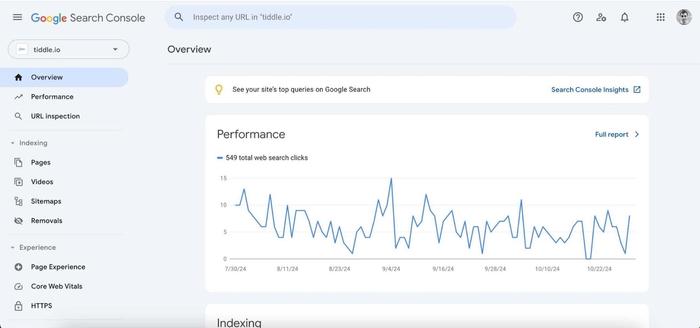
Google Search Console provides various SEO insights without the cost of premium tools such as Ahrefs or SEMRush. It focuses on how your website performs in Google search, showing exactly which keywords you rank for, which pages attract organic traffic, and whether your site meets Google's performance standards – including Core Web Vitals.
It also checks mobile usability and security issues, notifying you of any penalties or manual actions that could affect your rankings.
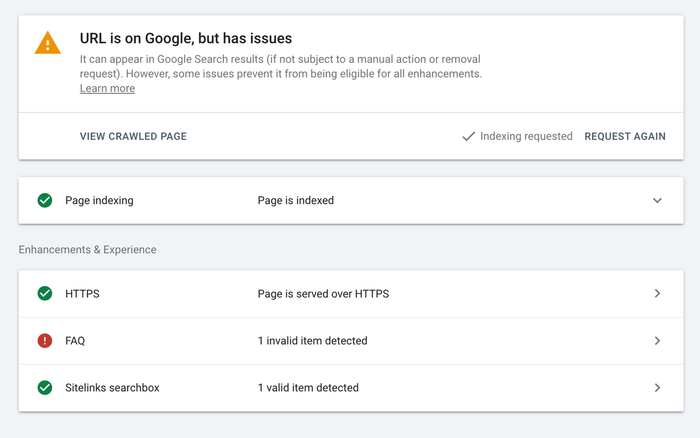
For small businesses, Google Search Console is a direct line to Google’s view of your site’s search health.
Our rating: 9/10
Matomo
For businesses looking for a powerful Google Analytics alternative that prioritizes privacy and data ownership, Matomo is a standout choice. Unlike Google Analytics, Matomo allows you to control your data fully – without the need for intrusive cookie consent banners.
This tool provides deep visitor analytics, traffic sources, user journey tracking, conversion tracking, and customizable dashboards, all while keeping your data private and secure.
Matomo is entirely free if you choose the self-hosted option.
Our rating: 7.5/10
Local SEO tools
For many small businesses, local SEO is the only SEO they need. Standing out in local search brings substantial benefits, including higher rankings in ‘local packs,’ greater visibility on Google Maps, more positive reviews, and increased engagement through website clicks, calls, and direction requests.
Ranking well for local keywords directly impacts revenue, making local SEO a massive part of a small business strategy. The best part? Many local SEO tasks can be handled in-house with the right tools.
Google Business Profile
Did you know that 64% of consumers turn to Google Business Profiles when searching for local services? Setting up your GMB profile is free and straightforward. You can manage your business details, share updates, showcase photos, and discover how customers find you.
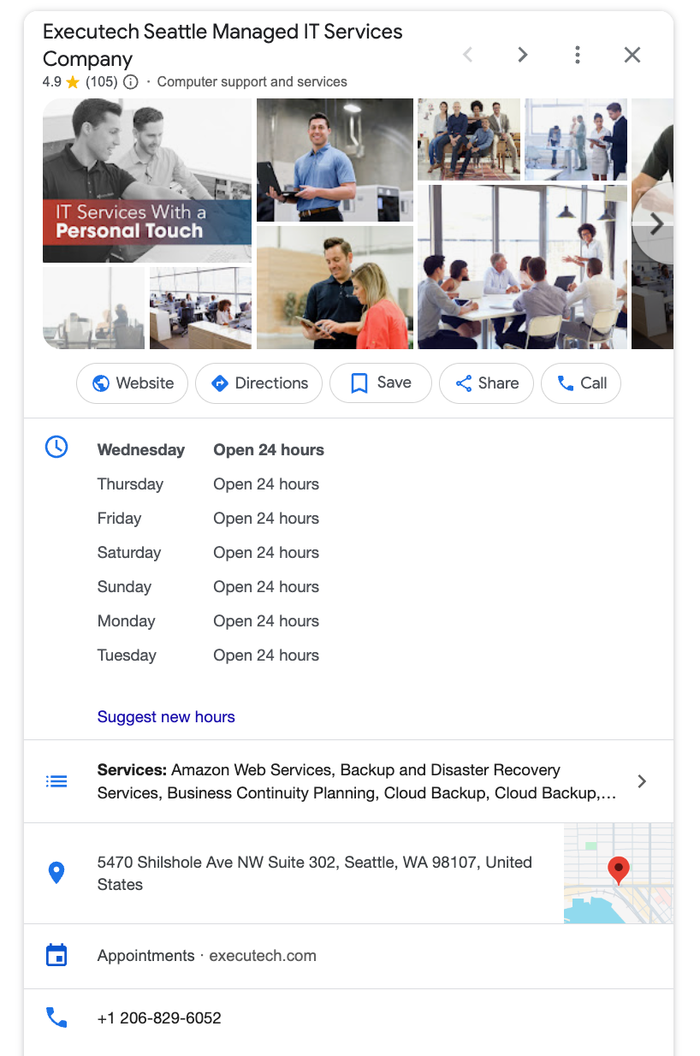
On top of that, you can post updates about events or promotions to keep your audience informed. Monitoring customer interactions provides valuable feedback to improve your services.
Our rating: 9/10
Whitespark
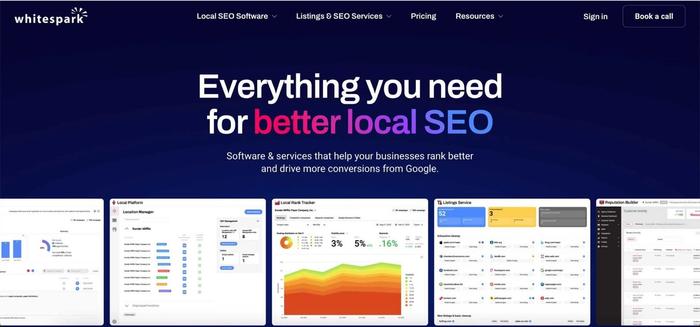
Looking to extend the capabilities of Google Business Profile? Whitespark is a solid local SEO tool for businesses that want more advanced features like citation building, local rankings tracking, and competitor analysis.
With Whitespark, you can gain a competitive edge in local marketing without technical knowledge.
Our rating: 8.5/10
Local SEO Agency Finder
Sometimes, managing local SEO in-house isn't feasible, and outsourcing becomes the best option. The Local SEO Agency Finder simplifies it by connecting you with agencies specializing in improving local search visibility.
Our rating: 7.5/10
Center AI
Managing multiple locations online just got easier! Center AI is a local marketing solution tailored for small businesses with multiple branches. It handles everything from online reputation management to review monitoring and customer engagement. It even protects your Google Business Profile from competitors and tracks keyword rankings for free.
7/10
Before you purchase your next SEO tool
Choosing small business SEO tools is more than just looking at their price. Before you pull out your credit card, make sure to:
- Choose tools that align with your needs and budget. For complete beginners, a simple combination of Google Search Console and Google Analytics can be enough to get started. There is no need to pay hundreds per month for complex tools you won't understand!
- Try before you buy. Almost all of the best SEO tools for small businesses offer a free trial or a limited free version. This is a great learning opportunity, and you can determine if the SEO software meets your needs.
- Be honest about your knowledge of SEO. Don't opt for comprehensive SEO suites if you're just figuring out how search engines work. Consider your current understanding of SEO and select a tool that matches your skill set.
- Feel free to experiment. Some SEO tools can have steep learning curves, take too much time to provide results, or not fit into your marketing tech stack. Try out different software until you find something that helps you rank well in search results.
Wrapping up
Improving your small business's online presence doesn’t have to cost a fortune. Free tools like Google Analytics, Google Search Console, and Google Business Profile offer powerful ways to improve your website’s performance and attract more visitors. If you need to go further, plenty of budget-friendly tools can help you grow without overspending. Good luck!




